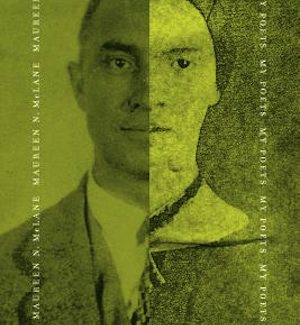Life-Defining Poetry
Maureen N McLane’s deeply personal and eccentric "My Poets" is a meditation on the works that have "most marked" her by Chaucer, Gertrude Stein, William Carlos Williams, Marianne Moore, Emily Dickinson, Shelley and Louise Gluck McLane’s deeply personal and eccentric "My Poets" is a meditation on the works that have "most marked" her by Chaucer, Gertrude Stein, William Carlos Williams and Emily Dickinson .
“My Poets” A book by Maureen N. McLane
When a friend suggested to Pauline Kael that she write her memoirs, the New Yorker film critic pointed to her reviews and said, “I think I have.” For Kael, the story of her life was the story of the films she had watched and her reactions to them.
Works of art — film, music, poetry — can invoke, and sometimes define, an entire era of one’s life. Maureen N. McLane’s “My Poets” is part memoir, part literary appreciation; it’s a meditation on the poems that have intrigued, instructed, fascinated, troubled and sustained her. A poet and critic who teaches at New York University, she has written a book about “what most marked me” — works of poetry that she and many other readers love, by Chaucer, Gertrude Stein, William Carlos Williams, Marianne Moore, Emily Dickinson, Shelley and Louise Gluck, among others.
But this is nonetheless a deeply personal and eccentric book. McLane is idiosyncratic not in the poets she selects, but in why she selects and how she responds to them. Chaucer and Moore, for instance, figure here largely because of the role their poetry played in McLane’s life when she fell out of love with a man and in love with a woman. The chapter on Chaucer focuses on his use of the word “kankedort,” which, according to the Oxford English dictionary, refers to “an awkward affair” and does not occur anywhere outside of “Troilus and Criseyde”:
“What should I say of kankedort other than the word constellates a time, a time of reading, a time of slow dawning and changing, of delicate then desperate realizing over many months and belatedly that I was in a kankedort; I was sick with love; I was in love with another; I knew not what to do; I did almost nothing; I found myself at dulcarnoun, at my wittes end; I almost did something bold; I didn’t; then I did; then the plot changed, or its true drift was revealed — if only in retrospect.”
As for Moore, McLane writes, boldly, that her “Marriage” is “the best poem on marriage since, perhaps, ‘Paradise Lost.’ ” McLane’s discussion of “Marriage,” though, does not convincingly demonstrate the poem’s power. As in much of this book, her prose veers unpredictably and at times exhaustingly between ideas, images, metaphors, concrete details, quotations and whatever else the author feels like throwing in:
“Moore’s poem may have taught me more than any debate between Anglo-American and French feminists, or between, say, object-relations and Lacanian analysts. Or perhaps it taught me nothing: poems aren’t for teaching; they insinuate; they are of the Tree of Life and of the Tree of Knowledge; they are ‘something feline,/ something colubrine.’ “
This is a typical passage in “My Poets”: It begins straightforwardly, but then wanders into obscurity and opacity, carrying too heavy a weight out on too slender a limb.
Also off-putting is McLane’s penchant for trying to emulate the language of the poets she discusses. This is sometimes clever, but there are moments, particularly when the object of imitation is Gertrude Stein, when it’s downright disastrous. (Stein has already given us enough imitations of Stein.) The voice slips from invocation and risks collapsing into parody:
“I thought I could make Stein mine. I thought I would make a valentine my own thesis on Gertrude Stein. And then I read Stein or other Stein and found I could not find through Stein a line much less a through-line.”
There are good moments, though, as when McLane observes of H.D.: “It is no dispraise to be a poet best served by an anthology, a rigorously pruned selected — no dispraise particularly for this poet, who knew very well that ‘anthology’ comes from the Greek: a gathering of flowers.” And I enjoyed the centos that McLane, who has published two books of her own poetry, has constructed out of lines taken wholesale from poems that she admires.
Poetry is, by its nature, an idiosyncratic art, and readers’ responses are always highly individualistic and subjective, a fact that “My Poets” demonstrates. For the most part, I admire the gutsiness with which McLane pursues her project, even if the results of the aesthetic risks she takes are sometimes hard for me to identify with or even to grasp. “My Poets” did not mark me the way McLane’s subjects marked her, but I would not discourage other readers from opening its covers to see what might be found here.
Troy Jollimore won the National Book Critics Circle Award for poetry in 2006 and is the author of “At Lake Scugog: Poems” and two books of philosophy: “Love’s Vision” and “On Loyalty.”
©2012, Washington Post Book World Service/Washington Post Writers Group
Your support matters…Independent journalism is under threat and overshadowed by heavily funded mainstream media.
You can help level the playing field. Become a member.
Your tax-deductible contribution keeps us digging beneath the headlines to give you thought-provoking, investigative reporting and analysis that unearths what's really happening- without compromise.
Give today to support our courageous, independent journalists.







You need to be a supporter to comment.
There are currently no responses to this article.
Be the first to respond.